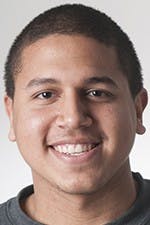My name is Sergio Martínez-Beltrán, and I speak Spanish.
Yes, I know many people speak Spanish; the only difference is that Spanish is my native language. I was born and raised in Puerto Rico, a beautiful island in the Caribbean (just in case you don’t know), where the main language is Spanish. After learning English my whole life, I’m considered a bilingual person.
I’m sure that if I want to speak Spanish anywhere in East Lansing or anywhere in the U.S., I have the right to do it. I am free to use whatever language I want. I shouldn’t be judged or mocked for exercising my rights.
A couple of days ago, I was speaking Spanish with one of my friends. After a few minutes of conversation, my friend cracked a joke and we all broke out laughing.
Then I heard someone say “Speak English, this is ‘Murica.”
News flash — Puerto Rico is part of America. And either way, there’s no law requiring me to speak English 24/7.
I turned around and didn’t say anything. I didn’t know if that person was serious or if she was just joking, but I found it very offensive.
This isn’t the first time I’ve been made fun of for speaking Spanish, but it still stings every time. I wasn’t doing anything wrong. I was just talking with my friends.
It is not my fault that in this century, people still believe that knowing just one language (English) will position you at the pinnacle of success.
I know, not everybody in the U.S. has this view of foreign languages. There are a lot of people that find other languages and cultures very interesting, but there is a silent minority (or majority?) that perpetuates the notion that when in America, you must only speak English.
Hey, Americans, if you don’t know how hard it is to speak another language that is not your native one for 24 hours, please wait in line and save your comments.
People have told me they worry when they can’t understand what I’m saying to another native Spanish speaker. There’s a sense of paranoia, at times.
Look, I understand it must be frustrating if you don’t know my language. But I had to experience similar challenges often when I was learning English, too. Even today I am learning new words, but I don’t get offended if you are using a word I haven’t learned yet. It’s an opportunity for me to grow.
But it isn’t just new words that challenge me. With every conversation I have in English, my brain is translating what’s being said into Spanish. When I speak, I translate back from Spanish to English. Imagine how exhausting that must be.
At the end of the day, it’s nice to be able to take a break and just speak freely in the language I grew up with. It helps me feel at home. And trust me, at the end of the day, the last thing I want to do is be told it’s not OK for me to be myself.
It’s important to understand that we, the people that speak other languages, are not talking about you every time we use our home languages, such as Spanish, Chinese, French or Arabic.
I don’t use my language as a way to mask my feelings about you. If you’re bothering me, I’ll tell you in English. Those were some of the first phrases I made sure to learn.
How low is your self-esteem, ‘Muricans? If you cannot respect other languages, how do you consider ‘Murica the “home of the brave?” I know you can be brave enough to accept others, including those you don’t understand. That’s very brave and that is what we should be doing in this decade.
One last thing, please stop saying “‘Murica.” Even if you think it’s just a joke, it injects a false patriotism and a little dose of racism. And we are not even going to talk about your official language...wait.
Sergio Martínez-Beltrán is a State News reporter. Reach him at smartinez@statenews.com.
Support student media!
Please consider donating to The State News and help fund the future of journalism.
Discussion
Share and discuss “I thought this
was ‘Murica” on social media.







